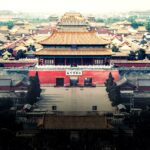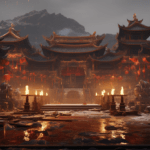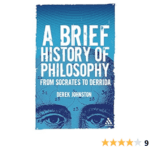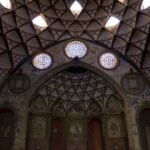Step into the intriguing world of the Han Dynasty’s Golden Age as we embark on a journey of discovery through the realms of literature, music, and philosophy. Join me, a passionate writer and seasoned explorer of ancient civilizations, as we delve deep into the profound artistic and intellectual landscape that defined this transformative period in Chinese history. Unearthing the hidden gems of literary masterpieces, enchanting melodies, and profound philosophical ideas, this article is a captivating portal to the wonders of Han Dynasty’s Golden Age.
Han Dynasty Golden Age: Literature, Music & Philosophy
The Han Dynasty was a transformative period in Chinese history, often referred to as a golden age due to its profound impact on Chinese civilization. During this era, incredible advancements were made in the realms of literature, music, and philosophy, shaping the intellectual and cultural history of the Chinese people. Let’s embark on a journey to unearth the wonders of the Han Dynasty’s golden age, where captivating masterpieces, enchanting melodies, and profound philosophical ideas flourished.
Literature: Stories that Transcend Time
Literature during the Han Dynasty was a treasure trove of stories that captured the hearts and minds of its people. One notable work was the Historical Records written by Sima Qian. This masterpiece chronicled the history of China from legendary times all the way to the Han Dynasty itself. Through vivid storytelling and meticulous attention to detail, Sima Qian brought the past to life, allowing readers to connect with their cultural heritage on a deeper level.
But the richness of Han Dynasty literature extended beyond historical accounts. Poetry, in particular, flourished during this golden age. Renowned poets like Sima Xiangru and Ban Zhao composed elegant verses that mirrored the aspirations, joys, and struggles of the Chinese people. Their words became a mirror reflecting the beauty and complexity of life during the Han Dynasty.
“Through the pages of Han Dynasty literature, we can travel back in time and immerse ourselves in the hopes, dreams, and challenges of our ancestors.”
Music: Melodies that Stir the Soul
As literature captivated the minds of the people, music enraptured their hearts during the Han Dynasty. Music played a significant role in Han society, with a wide range of instruments and musical styles embraced throughout the empire. The sheng, a mouth-blown free reed instrument, and the pipa, a plucked string instrument, were heavily favored during this period.
It was through music that emotions found expression, and artists like Gao Jianli, a master musician of the Han Dynasty, skillfully composed pieces that captured the essence of the human experience. These enchanting melodies not only entertained but also served as a gateway to self-reflection and introspection, guiding listeners on a personal journey of discovery.
“Just as a symphony resonates deep within our souls, the music of the Han Dynasty had the power to touch the hearts of an entire civilization.”
Philosophy: Illuminating the Path of Wisdom
Philosophy in the Han Dynasty revolved primarily around Confucianism, which became the dominant school of thought. Confucian principles, emphasizing the importance of moral virtue, social harmony, and respect for ancestors, shaped the ethical and intellectual landscape of Chinese society.
One influential philosopher of the Han Dynasty was Dong Zhongshu, who expanded upon Confucian teachings by integrating them with the cosmic principles of yin and yang. Dong Zhongshu’s ideas offered a comprehensive worldview that connected the spiritual, the natural, and the human realms.
“As we delve into the wisdom of the Han Dynasty philosophers, we uncover timeless truths that continue to guide us on the path of virtue and enlightenment today.”
Unearthing the Han Dynasty’s Golden Age
The Han Dynasty’s golden age was a transformative period in Chinese history that witnessed remarkable achievements in literature, music, and philosophy. It is through these artistic and intellectual endeavors that we gain insight into the rich tapestry of Chinese culture and heritage.
As we explore the boundless depths of Han Dynasty literature, we connect with the stories that shaped their world. Through enchanting melodies and soul-stirring music, we experience the emotions that transcend time. And in the profound ideas of Han Dynasty philosophers, we discover wisdom that continues to illuminate our lives.
“Join me on this captivating journey, as we unearth the treasures of the Han Dynasty’s golden age. Together, we will delve deep into the realms of literature, music, and philosophy, embracing the wonders that await us.”
The Han Dynasty was a period in Chinese history known as the “Golden Age,” marked by remarkable achievements in various fields. From advancements in technology and art to the establishment of a centralized government, the Han Dynasty was a time of great prosperity and innovation. To explore more about the fascinating Han Dynasty Golden Age, click here and immerse yourself in a world of ancient wonders and accomplishments.
of Heaven is to study history and learn from the mistakes and successes of past rulers.
[youtube v=”ylWORyToTo4″]
Confucius, a philosopher and political thinker who lived during the Warring States period, believed that the key to creating a stable and peaceful society was to follow the example of the sage emperors of the past. He emphasized the importance of knowing one’s place in hierarchical relationships and acting accordingly. Filial piety, or the respect and reverence a son shows to his father, was considered a fundamental virtue. Confucius believed that if every individual strove to be morally upright and fulfilled their responsibilities within these relationships, society as a whole would run smoothly.
For the Chinese emperor, who was seen as the father of the whole country, maintaining moral behavior and acting as a superior man (Qin Zi) was crucial for upholding the Mandate of Heaven. The Mandate of Heaven, a concept that originated during the early Zhou dynasty, claimed that the authority to rule came from heaven and that a ruler who acted morally and justly would retain the mandate, while an unjust or immoral ruler would lose it and be overthrown. This concept of divine intervention explained the rise and fall of dynasties in a cyclical pattern throughout Chinese history.
Early Chinese historians, who were mostly trained in Confucian classics, often emphasized the importance of moral behavior in their historical accounts. They saw the Mandate of Heaven as the underlying cause for the rise and fall of dynasties. When a dynasty fell, it was believed to be because the ruler had lost the Mandate of Heaven due to improper behavior or moral corruption. This explanation neatly aligned with Confucian principles and reinforced the importance of moral behavior as the foundation of a stable society.
However, it’s important to note that this historical interpretation heavily relied on Confucianism and may not accurately reflect the complex political and social dynamics of ancient China. Modern historians might argue that a dynasty’s decline and fall can be attributed to a combination of factors, such as economic instability, external invasions, or internal conflicts, rather than solely focusing on the moral behavior of the rulers.
In conclusion, the way history is told shapes our understanding of past events and the underlying causes for the rise and fall of civilizations. In the case of Chinese history, the concept of the Mandate of Heaven and the emphasis on moral behavior, as advocated by Confucius, played a significant role in shaping the historical narrative. Understanding these cultural and philosophical perspectives is vital for comprehending the complexities of China’s rich and ancient history.
FAQ
Q: What was the Han Dynasty?
A: The Han Dynasty was an imperial dynasty of China that lasted from 202 BC to 220 AD, known for its achievements in government, law, philosophy, history, and art.
Q: What were some of the cultural achievements of the Han Dynasty?
A: The Han Dynasty is considered a golden age in Chinese history and had lasting effects on Chinese culture. It saw advancements in literature, philosophy, science, and technology, as well as the establishment of Confucianism as the dominant philosophy.
Q: How did the Han Dynasty contribute to the development of trade and cultural exchange?
A: The Han Dynasty saw the first official trade with Western cultures through the Silk Road. Its trade routes, connecting China to the West, became known as the Silk Road and played a crucial role in promoting cultural exchange and economic growth.
Q: What are some notable literary works from the Han Dynasty?
A: Literature and philosophy flourished during the Han Dynasty. Notable works include the Historical Records written by Sima Qian, which greatly influenced Chinese intellectual and cultural history.
Q: Why is the Han Dynasty often referred to as a golden age?
A: The Han Dynasty is often described as a golden age due to its significant achievements and profound influence on Chinese civilization. Its cultural accomplishments, advancements in science and technology, and establishment of enduring philosophies have shaped the identity of the Chinese people to this day.
















